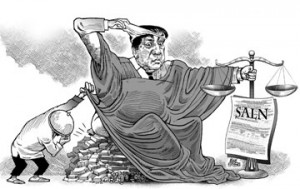
It comes as no surprise that many public officials became millionaires, particularly prosecutors who are perceived rightly or wrongly as being paid less than their counterparts in the private sector.
Aside from Cebu City Mayor Michael Rama, the stories of Cebu Daily News on the SALNs of these public officials hardly drew a peep of protest. While the mayor may not be contesting the figures stated in the stories, he was upset over how his wealth was portrayed.
To be fair, anyone would have done a double take upon seeing how the mayor’s net worth rose by over 100 percent in four years (Rama inherited some valuable real estate in Cebu City from his grandfather Don Vicente Rama, for which he will have to pay taxes). The details are in the story.
Still, other officials whose personal wealth was disclosed in their SALNs were bemused, if not rather cryptic in their explanations of how they could have amassed much wealth in very little time. One prosecutor laughed off a query about his fortunes posed by a CDN reporter.
Again, never has the significance of the SALN, which is written and submitted under oath, been more highlighted than in Corona’s impeachment trial, which led to the exposure of such fine details as his alleged multi-million peso and dollar accounts accumulated in the past decade.
But we find it questionable that government officials are still allowed to use to the old form of the SALN. Does not the old form hinder the public’s view of an official’s financial status?
This form is preferred by public officials who can, with the help of some accountants, fudge numbers in order to hide their actual worth. Conversely, the old SALN form makes it hard for the public to determine if a government worker is hiding some ill-gotten wealth.
The SALN, like the Commission on Audit, is supposed to help keep public officials especially elected ones honest and accountable to their constituents. That same check is also required of appointed officials who ultimately owe their post not to the President but to the Filipino people who pay their salaries.
It would be best if officials are made to uniformly use the revised SALN form issued in 2011. The details sought in the new SALN, like the kind of real property (residential, commercial or agricultural), its nature (paraphernal, conjugal or community) as well as year and mode of acquisition and assessed and fair market value of a property help shut any avenue for fabricating data.
The new SALN is a more potent magnifying glass, so to speak, that makes it easier to detect the devil in the details of government workers’ wealth. It compels them to obey the people who have taken one step forward in civic sense through a louder clamor for transparency.